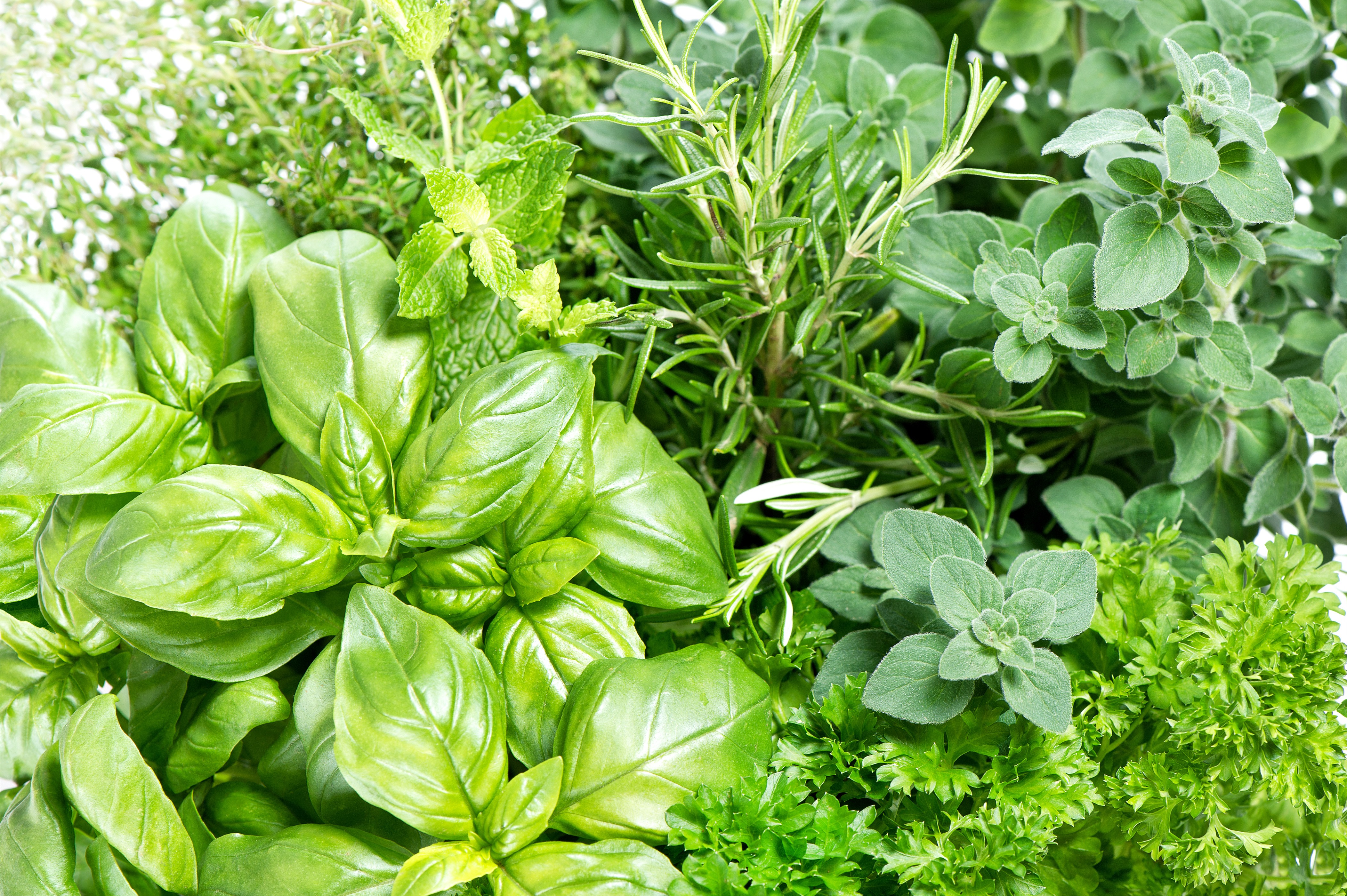Ramsons or wild garlic is a protected plant and should not be harvested from the wild. Ramsons have a milder flavour than garlic and should be used before the plant comes into bloom. The bulbs are edible as well, so if you have a bumper crop of ramsons, you can remove the bulbs in the autumn and use them as garlic cloves. The bulbs do have a sharper taste than ordinary garlic.
HERBS
If you like to cook, you like to have fresh herbs on hand.  Many herbs can also be used for minor ailments.
Many herbs can also be used for minor ailments.
We carry a wide selection of herbs in high season, too many to mention here. Some herbs are also on sale for a limited period of time.
If you want to create a herb garden, it is best to draw a map. Where is there a lot of shade? What is the sunniest place in the garden or on the patio? You can also put your herbs on the rooftop terrace of your apartment or office.
It is important to decide in advance which herbs you want in your garden or container. Most herbs grow best in a bright spot with at least 6 hours of sunshine a day.
You can put your herbs in between the other plants in the garden or make a separate herb garden, as long as you remember what is growing where and you don’t use the perennial right next to your herb to make soup.
If you are planting your herbs in a pot, you have to make sure the water drains easily. When growing herbs in a container, it is also best to use special potting soil for herbs, rather than normal garden soil.
Stevia is a natural sweetener that does not add any calories. The young leaves are slightly less sweet than the older ones.
Rue (Ruta graveolens) is said to repel cats, but you certainly need more than a single plant to achieve that particular goal.
We tend to carry mint in different varieties throughout the season: chocolate mint, peppermint, strawberry mint, ginger mint, apple mint … Mint has wide-spreading underground stolons that allow the plant to emerge several metres away. It is best to confine your mint to a specific area, or you may find it all over your garden. You can cut the bottom out of a bucket and sink it into the soil leaving an edge of about 5 cm above the ground. Or you can plant your mint separately in a container.
Rosemary and thyme are examples of hardy herbs.
Lemon balm is a perennial plant that does well in a cool place in the sun or in the shade.
Cicely is a perennial plant that prefers shady places.
Tarragon is sensitive to the cold and prefers a sunny spot. Make sure to move it indoors when the frost comes. The more sun your tarragon gets, the more flavour it will have.
Basil is not hardy and very sensitive to the cold.
Borage, also known as starflower, is an annual plant that can stay in the garden from year to year by self-seeding. Borage has pretty blue hanging flowers. Borage is excellent in a cucumber salad and the edible blue flowers add a pleasing decorative touch.
Dill (Anethum graveolens) is an annual plant. It can grow up to 1.20 m.
Coriander or cilantro (Coriander sativum) can be kept outdoors from May and prefers a sunny spot. Both the leaves and seed can be used.
Winter savory (Satureja montana) is a perennial herb. It grows about 40 cm high and is an attractive border plant for any culinary herb garden. The winter savory grows tiny pale pink flowers in July and continues to bloom until September. Summer savory (Satureja hortensis) is an annual, but its use and flavour are similar to the perennial winter savory.
Did you know that many herbs contain valuable substances, but should not be used during pregnancy? Artemisia absinthium (absinthe wormwood) should be avoided when pregnant.
Which herbs can you plant in the shade?
- Parsley: too much sun will scorch the leaves and they will turn yellow and brown
- Chives also thrive in the shade.
- Chervil
- Mint: grows almost anywhere, also in the shade.
- Galium odoratum or sweetscented bedstraw is also at its best in the shade and can be used as ground cover with its small, delicate white flowers.
- Bergamot
- Lovage (Levisticum officinale)
- Lemon balm
If you want to preserve your herbs, some herbs are best frozen and some are best dried.
Freezing is the best option for basil, dill, fennel, coriander, chervil, parsley and chives. Freezing herbs is the best method to keep their colour and flavour intact.
Good luck! We hope you enjoy your gardening efforts and the great taste of the fruits of your labour afterwards.






